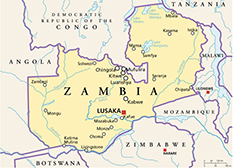Zambia Education Quality Improvement Project 2 (EQUIP 2)
 With a high rate of poverty, poor technical infrastructure, and difficulty providing service to and accessing information from remote and disadvantaged areas, Zambia has not enjoyed the benefits of a quality education system. In 2003, the government sought to achieve increased and equitable access to quality education at all levels through a variety of policy decisions, initiatives, and programs.
With a high rate of poverty, poor technical infrastructure, and difficulty providing service to and accessing information from remote and disadvantaged areas, Zambia has not enjoyed the benefits of a quality education system. In 2003, the government sought to achieve increased and equitable access to quality education at all levels through a variety of policy decisions, initiatives, and programs.
In response to this demand, the Zambia EQUIP 2 Project began in March 2004 and grew out of a previous project with the Ministry of Education (MoE). Over a sustained period of time, this USAID-funded project evolved into a multi-component strategy that strengthened the MoE in its ability to lead and engage with stakeholders to reach education goals.
AIR, a sub-grantee to the Academy for Education Development on EQUIP 2, carried out the Continuous Assessment component. The program focused on providing high quality technical expertise in a wide range of areas, adapting to the changing priorities of the MOE. In addition, an HIV/AIDS workplace program was added, using PEPFAR funding. Moreover, in 2007 the project began work on an institutional response to the Community Schools. Even more responsibilities were added in 2008 with school health and nutrition, budgets, and a human resources information system.
The results of EQUIP 2 focused on five core areas:
- First, it built the foundations for systemic, nationwide, school-based reform across nine provinces, 73 districts, and, eventually, all primary schools (8,000+), by training head teachers on education leadership and management, particularly in instructional leadership
- Second, it fostered the practice of using data, information, and research to improve decision-making, accountability, and resource allocation at all levels (from national- to school-level).
- Third, EQUIP 2 strengthened the management systems and coordination guidelines within the MoE headquarters, across the wide range of stakeholders in the education sector, and “up and down” the system.
- Fourth, it brought a new level of energy, ownership, engagement, and accountability around school quality, teaching, and learning throughout the education system through the support of local policies, guidelines, and practices.
- Fifth, it provided technical assistance on a daily basis inside the MoE, in accordance with the Paris Declaration and SWAP environment approach to foreign assistance.
Through EQUIP 2, AIR provided technical and financial assistance to the Zambian education ministry to promote teachers’ use of school-based assessment data to improve classroom instruction and to enhance teachers’ regular use of performance records through a national system of continuous student assessment.